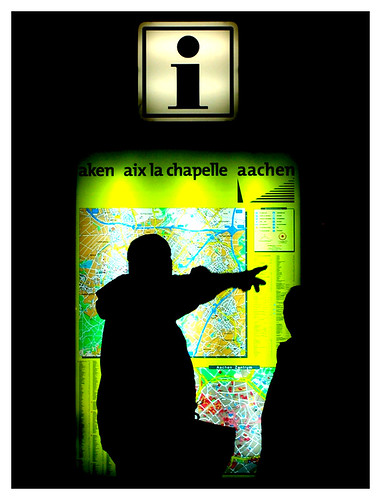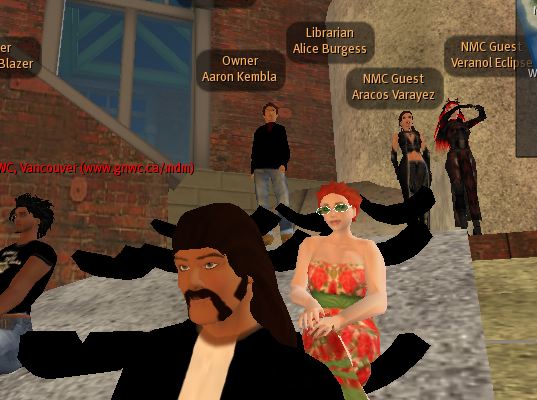So some time back D’Arcy tagged me with the “Five Things” meme. I normally ignore these things, but D’Arcy has responded to too many of my requests for me to blow him off. I’ve also been tagged by Steve Dembo (welcome to the world Aiden!) and Tony Hirst (yeah Hawkwind!). One wonders why I of all people would be so resistant to going on about myself, so here goes…
—–
Saskatoon, Saskatchewan was a great place to be a kid, but my exposure to cultural options was rather limited. In 1981, cable TV came to town. Shortly after, I remember sneaking downstairs in the middle of the night and watching some kind of New York-based music video show. Obviously, I’d never seen anything like any of it. The two artists who made the biggest impression on me that night were Laurie Anderson (“O Superman” and “Sharkey’s Day“) and The Residents (“Hello Skinny“). It’s safe to say this covert nocturnal adventure warped me for life. Since then, I can’t begin to estimate how much money I’ve spent blindly buying albums because they promised to be ‘weird’. I eventually saw both Anderson and The Residents live (in 1996 and 2001 respectively), both on “greatest hits” type tours, so I got to hear all three of the nostalgic favorites linked above — I felt I was being very indulgent of my inner child those nights.
—–
On my first trip to Europe, with my father in 1988, we stayed at the same insanely overpriced hotel in Rome (The Ambassadori) as Duran Duran. Shared a few elevator rides. There seemed to be nobody else in the establishment, and given that breakfast (billed whether you ate it or not) was more expensive than rooms in most places, perhaps that’s not surprising. The American embassy was across the street, and I amused myself by doing suspicious but harmless things on the street and in our hotel room window, in hopes of getting on some sort of CIA watchlist (obviously, this was a more innocent time, and I a more reckless soul).
—–
I don’t keep my academic degrees on display, in fact I’m not even sure where they are. But I do flash my “Chainsaw Carpenter” plaque and certification ostentatiously on my desk. It was presented to me after six months working with perhaps the most unlikely and lowest-paid renovation crew ever assembled — mostly consisting of drug addicts and other misfits who were about to be evicted from the century-old Saskatoon building that was being gentrified. I was living in the building next door, not finishing my thesis, and was gradually swept in, working fourteen hour days and pretty much living inside the madness. It was a compelling contrast to graduate school. The project manager was fresh off a ten year stint in prison for drug-running, lived in an old converted schoolbus, and wrote striking songs of prairie freakerdom with titles like “Son of a Sodbuster” and “Lost in the Bathroom (I Took Too Much Acid)”… I never learned so much as I did with that job. I did framing, drywall, restored hardwood floors, plumbing (installing 30 toilets, and 20 vintage tubs, innumerable pipe patches), and all sorts of other things that continue to come in handy. I gave serious thought to giving up school and working a trade. I also got a close-up sense of what life is like for the poorest, most damaged and least privileged members of our society, and I hope I never forget those hard lessons.
—–
My introduction to online learning was in Hermosillo, Mexico as a Profesor de Ingles (yes, that was my title) with the Tec de Monterrey, a system of thirty campuses across the country with what was billed as the largest virtual university in Latin America. It’s an expensive school, so the experience of how social class functions in an impoverished country probably set me in stone as a pinko for life — I used to tease my students about how proud I was to be “training the next generation of oligarchs.” But that aside, it really was one sweet job. The students were very smart and very fun, already spoke English quite well, the facilities were first-rate, and I had total freedom to teach whatever I wanted. The school was very generous in supporting my training with technology and pedagogy — including a distance course from UBC in a precursor of the program that I now teach with part-time from Vancouver. I’ve never enjoyed a job more, and don’t think I’ve ever been better at what I did. Life was good. I hope to go back and do something like it again. Viva Mexico!
—–
I’ve had a gun fired at me in anger on three occasions:
1) By racist skinheads as I waited outside the Saskatoon Arena for a Metallica concert December 15, 1986. (Like Jeremy, I’ve seen Metallica twice, though not since 1989.)
2) By the raving drunk foreman of my treeplanting crew at the culmination of a riotous day-long bush party. It was in a remote planting camp in northern British Columbia, 1995. Our crew of seventy had been banned from all the surrounding towns, with ample justification, so when our days off arrived the helicopters flew out our dirty laundry and brought in vast quantities of alcohol to our deranged woodland outpost. It was something like living inside a trippy Vietnam War movie. We constructed a massive sweat lodge that could hold everyone in the camp (I heard it degenerated into an orgy), and someone cooked up some kind of potent homemade hallucinogen made from morning glory seeds that found its way into all sorts of unattended beverages.
Predictably, the night ended in violent recrimination, and I cowered behind my tent as my boss opened fire on us.
3) In Hermosillo, two young women and I walked past a group of drunken hoodlums that made some lewd remarks and we responded with derision. A few minutes later a shot was fired from across a vacant lot and it took us a few seconds to figure out what that whistling sound above our heads really was.
In each case, I do not believe there was intent to kill, the bullets went harmlessly overhead.
—–
It’s tough for me to tag anyone, as I am only dimly aware of who has done this (I was unplugged over Christmas, when a lot of this sillyness first went down) or who’s been tagged by someone else already. That, and I would expect most of my buds find these blogs memes as annoying as I do. Gardner C. and Bryan A. have been tagged already. Jim has already given me five things on another, far more important front, but what the hell. One of UBC’s Career Experts? Jason? Scott? Patricia? Is there anybody out there sitting on the sidelines, just waiting to be tagged, shoulders slumped, feeling left out? If so, I express heartfelt solidarity with you, and you should consider yourself tagged, my friend.
Update: I should have tagged Mike Roy, who has done great work with the Academic Commons and elsewhere. I most recently had a couple great chats with him in San Antonio when I was there for the NMC Regional Conference.





